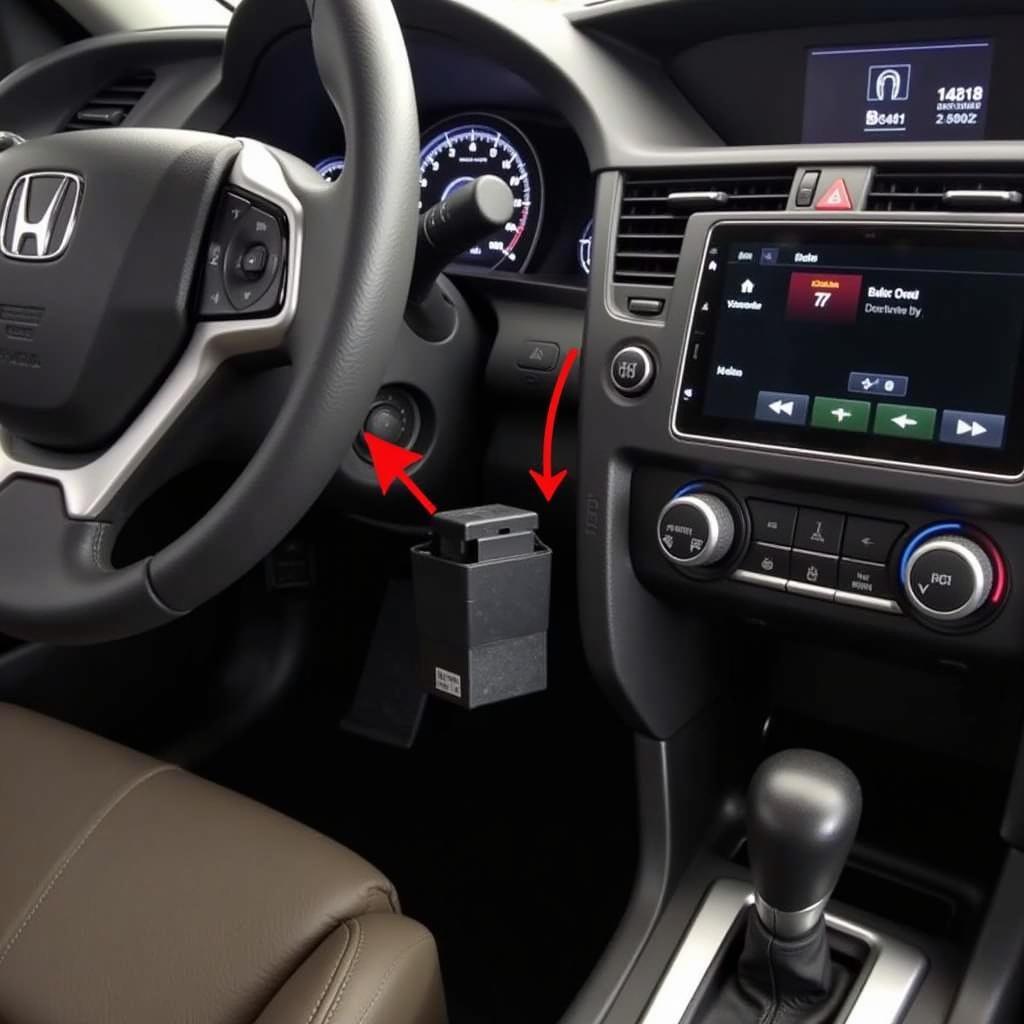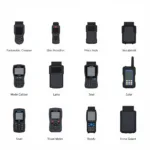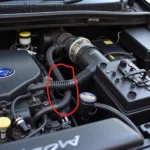The OBD2 port in your Honda Civic is a powerful tool for understanding and diagnosing issues. By knowing the OBD2 pinout Civic arrangement, you unlock the ability to communicate with your car’s computer, read diagnostic trouble codes (DTCs), and gain valuable insights into your vehicle’s health. This comprehensive guide will dive deep into the world of OBD2 pinout for Honda Civic, empowering you to troubleshoot with confidence.
Decoding the OBD2 Port: A Gateway to Your Civic
 OBD2 Port Location in Honda Civic
OBD2 Port Location in Honda Civic
Located under the driver’s side dash, the OBD2 port, often referred to as the DLC (Data Link Connector), is a standardized 16-pin connector. Each pin within this connector has a specific function, allowing you to connect a compatible OBD2 scanner and access a wealth of information about your Civic.
Honda Civic OBD2 Pinout: Understanding the Connections
While the OBD2 standard ensures a universal connector, the specific functionality of certain pins, particularly pins 7, 8, 9, 12, and 13, may vary between manufacturers and even models.
Here is a general overview of the OBD2 pinout found in most Honda Civic models:
| Pin Number | Function |
|---|---|
| 1 | Manufacturer Specific |
| 2 | J1850 Bus+ |
| 3 | Manufacturer Specific |
| 4 | Chassis Ground |
| 5 | Signal Ground |
| 6 | CAN High (J-2284) |
| 7 | ISO 9141-2 K-Line |
| 8 | Manufacturer Specific |
| 9 | Manufacturer Specific |
| 10 | J1850 Bus- |
| 11 | Manufacturer Specific |
| 12 | Manufacturer Specific |
| 13 | Manufacturer Specific |
| 14 | CAN Low (J-2284) |
| 15 | ISO 9141-2 L-Line |
| 16 | Battery Voltage |
Understanding the Key Pins:
- Pin 4 and 5 (Ground): These pins provide the essential ground connection for your OBD2 scanner.
- Pin 6 and 14 (CAN High/Low): These pins facilitate communication on the Controller Area Network (CAN) bus, a high-speed communication protocol used in modern vehicles like your Honda Civic.
- Pin 7 and 15 (ISO 9141-2): These pins use the ISO 9141-2 protocol, another communication standard found in some Honda Civic models.
Why Knowing Your Civic’s Pinout Matters
Understanding the OBD2 pinout Civic configuration is crucial for several reasons:
- Accurate Diagnostics: Having the correct pinout ensures you can use your OBD2 scanner effectively to read diagnostic trouble codes.
- DIY Repairs: With the pinout information, you can perform some DIY diagnostics and repairs, potentially saving on mechanic fees.
- Compatibility: If you need to use specialized diagnostic equipment, knowing your Civic’s pinout guarantees compatibility.
Common Honda Civic OBD2 Codes and What They Mean
Here are some of the most frequent OBD2 codes encountered in Honda Civics and their potential interpretations:
- P0420: Catalyst System Efficiency Below Threshold (Bank 1) – This code often indicates a failing catalytic converter.
- P0171: System Too Lean (Bank 1) – A lean condition points towards an issue with the air/fuel mixture, potentially caused by a vacuum leak or faulty oxygen sensor.
- P0300 – P0304: Random/Multiple Cylinder Misfire Detected – This range of codes suggests engine misfires, often due to spark plugs, ignition coils, or fuel injectors needing attention.
- P0135: O2 Sensor Heater Circuit Malfunction (Bank 1, Sensor 1) – This code signals a problem with the oxygen sensor heater circuit, essential for optimal sensor performance.
Beyond Basic Codes: Advanced Diagnostics with OBD2
While reading and understanding basic OBD2 codes is invaluable, your Civic’s OBD2 port can reveal much more. With a compatible OBD2 scanner and the right software, you can:
- View Live Data Streams: Observe real-time sensor readings, such as engine RPM, coolant temperature, and oxygen sensor voltage.
- Perform Actuator Tests: Activate components like fuel injectors, solenoids, and relays to diagnose functionality.
- Access Manufacturer-Specific Codes: Delve deeper into Honda-specific codes that provide more detailed insights into your Civic’s systems.
When Professional Help is Recommended
While DIY diagnostics are empowering, certain situations warrant the expertise of a qualified mechanic:
- Complex Electrical Issues: Problems with wiring, modules, or the CAN bus system are best left to professionals.
- Safety-Critical Systems: Diagnostics and repairs related to airbags, ABS, or other safety systems require specialized knowledge.
- Persistent Issues: If you’re unable to pinpoint the root cause of a recurring problem despite using an OBD2 scanner, seeking professional help is advisable.
Honda Civic OBD2: Your Key to Informed Car Care
Mastering the OBD2 pinout for your Honda Civic is a significant step towards proactive car maintenance. By understanding this system, you can communicate effectively with your vehicle, diagnose issues early on, and make informed decisions about your Civic’s care. Whether you’re a seasoned DIYer or simply want to be more informed, the OBD2 port is an invaluable resource for any Honda Civic owner.
FAQs about OBD2 Pinout Civic
Q: Can I use any OBD2 scanner with my Honda Civic?
A: While most standard OBD2 scanners will work, some advanced features may require a scanner specifically designed for Honda vehicles.
Q: Where can I find the OBD2 port in my Honda CRX?
A: Interestingly, the Honda CRX, particularly those manufactured before 1996, might use a different diagnostic connector. To ensure compatibility, refer to resources like honda dlc to obd2 for guidance on adapting older Honda models to the OBD2 standard.
Q: What does it mean if my OBD2 scanner doesn’t connect to my Civic?
A: A lack of connection could stem from a blown fuse, a faulty OBD2 port, or a wiring issue. Start by checking the fuses related to the OBD2 system.
Q: Can I clear OBD2 codes myself?
A: Yes, most OBD2 scanners allow you to clear codes. However, it’s essential to address the underlying issue that triggered the code in the first place.
Q: How often should I check my Civic’s OBD2 system?
A: It’s a good practice to scan for codes at least once a month or if you notice any unusual behavior from your vehicle.
Need More Help?
Have further questions about OBD2 pinout Civic configurations or need assistance diagnosing a tricky issue with your Honda? Don’t hesitate to reach out to our team of automotive experts. You can contact us via WhatsApp at +1(641)206-8880 or email us at [email protected]. We offer 24/7 support to help you keep your Honda Civic running smoothly.
For those intrigued by the unique challenges of earlier Honda models, delve deeper with our article on obd0 honda crx with obd1 wires and obd2 engine d16y8, offering insights into navigating the complexities of these classic vehicles.

